Wholesale, retail gap widens to 133%
Senior administration officials unaware of heavy profiteering in provinces
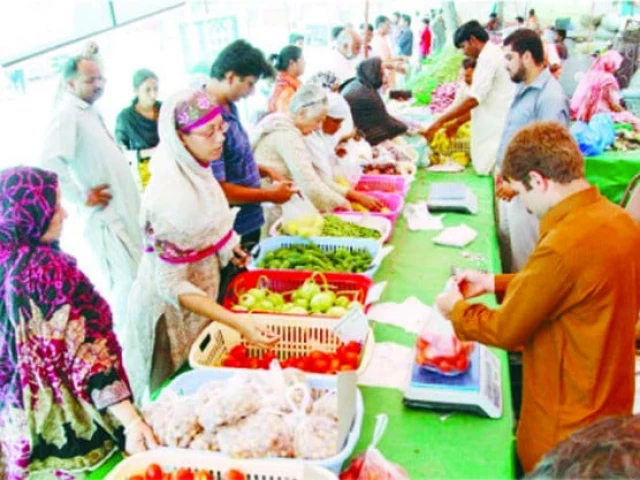
As the gap between wholesale and retail prices of a few essential commodities alarmingly widened to 133%, senior provincial administration officials of Punjab and Balochistan seemed unaware of the heavy profiteering taking place in their provinces, revealed proceedings of an official huddle.
Punjab chief secretary logged in to a price support decision dashboard hardly three times in the past one month compared to 88 times by Khyber-Pakhtunkhwa chief secretary, according to the data presented in a meeting of the National Price Monitoring Committee on Thursday.
The login activity was monitored by the Pakistan Bureau of Statistics (PBS) from March 5 to April 4, which was shared with the monitoring committee, headed by Minister for Planning Ahsan Iqbal.
The lack of monitoring of 256 items was visible in wide gaps between wholesale and retail prices, according to the findings presented to the committee.
Balochistan chief secretary did not bother to log in even once in the past one month while Sindh chief secretary entered the database 17 times.
The situation was also not different in the case of deputy commissioners in a few districts of Punjab and Sindh where bureaucrats did not monitor prices to make right decisions and check profiteering.
The deputy commissioners of Multan, Bahawalpur, Gujranwala, Hyderabad, Sukkur, Sialkot, Sargodha, Rawalpindi and Lahore did not login in the past one month, according to the official data.
"As per the federal cabinet's directives, all provincial governments are required to enhance their price monitoring systems," said a statement issued by the planning ministry. Senior provincial officers must ensure their active participation in the upcoming PBS sessions at provincial headquarters from April 16 to 28, said Ahsan Iqbal.
Islamabad deputy commissioner logged in only five times in one month and the result was that prices of essential commodities in his district were far higher.
PBS presented alarming wholesale-retail price gaps that exceeded 20% in major cities, with some differences, such as for onions and potatoes in Karachi and Quetta – standing above 100%, according to the planning ministry.
In Quetta, the gap between wholesale and retail prices of potatoes was 133.3%, onions 50%, tomatoes 40% and chicken 35%.
In Lahore, the seat of Punjab Chief Minister Maryam Nawaz Sharif, the gap between retail and wholesale prices of onions was 60%, tomatoes 30% and potatoes 25%. Punjab chief secretary entered the dashboard last time on March 19 while the Lahore deputy commissioner never logged in over the past one month.
In Rawalpindi, gram pulse and onion prices in the retail market were 51% higher than the wholesale market. In Peshawar, where the deputy commissioner did not bother to take benefit of the price support system, the retail price of potatoes was 53% higher than the wholesale market.
Price variation in the Islamabad Capital Territory (ICT) was 64% in the case of onions, 54% for pulses and 43% for tomatoes. In Karachi, onion prices were 106% and potato rates were 100% higher in retail as compared to wholesale markets.
The price monitoring committee decided that PBS would share detailed market-wise data of price gaps with the provincial and district administrations to facilitate effective action. PBS will also develop a three-month demand-supply trend forecast for essential items for Ramazan and Eid, and will present historical and recent price patterns of kitchen items in the context of Eidul Azha.
Provincial governments and the ICT administration will strengthen monitoring mechanisms to prevent hoarding and profiteering and will take strict action against violators, according to the planning ministry.
The food ministry will present a comprehensive plan in the next meeting for establishing cold chains for chicken and vegetable processing units and for developing strategies for land optimisation and crop mixing. It will also propose a plan for promoting the production of edible oil to reduce reliance on imports and stabilise prices.
PBS told the meeting that prices of chicken, potatoes and onions surged in the past week while banana prices increased earlier in the month. The minister noted the volatility in poultry prices and stressed the need to shift towards frozen chicken, a global standard that ensures greater price stability.
Ahsan Iqbal emphasised the need for a comprehensive annual price pattern and the development of a robust demand-supply mechanism for peak consumption periods, particularly during Ramazan, Eid and other festivals.
He directed all relevant ministries to ensure coordinated efforts to stabilise supply chains and the next meeting should specifically focus on preparations for Eidul Azha.
He recommended promoting tomato paste production to mitigate price fluctuations for tomatoes. He called for an analysis of the urban-rural price difference in Islamabad in the next meeting.
Expressing concern over the lack of institutional frameworks for key agricultural products, the minister criticised the absence of a national board for edible oil and vegetable processing. He stressed the urgent need for a land optimisation strategy to determine production targets, import needs and supply channels for major crops such as wheat, sugarcane and rice.
He underscored the importance of cold chains for perishable items and encouraged industrial processing of vegetables like tomatoes. He urged the food ministry to prepare an outcome-based plan to promote local production of heavily imported commodities, especially edible oil, and develop a roadmap for optimal land utilisation and crop mixing.






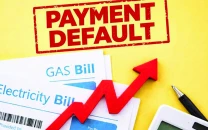
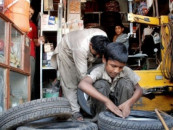


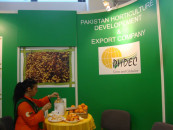




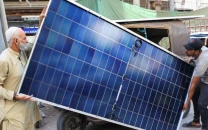







COMMENTS
Comments are moderated and generally will be posted if they are on-topic and not abusive.
For more information, please see our Comments FAQ